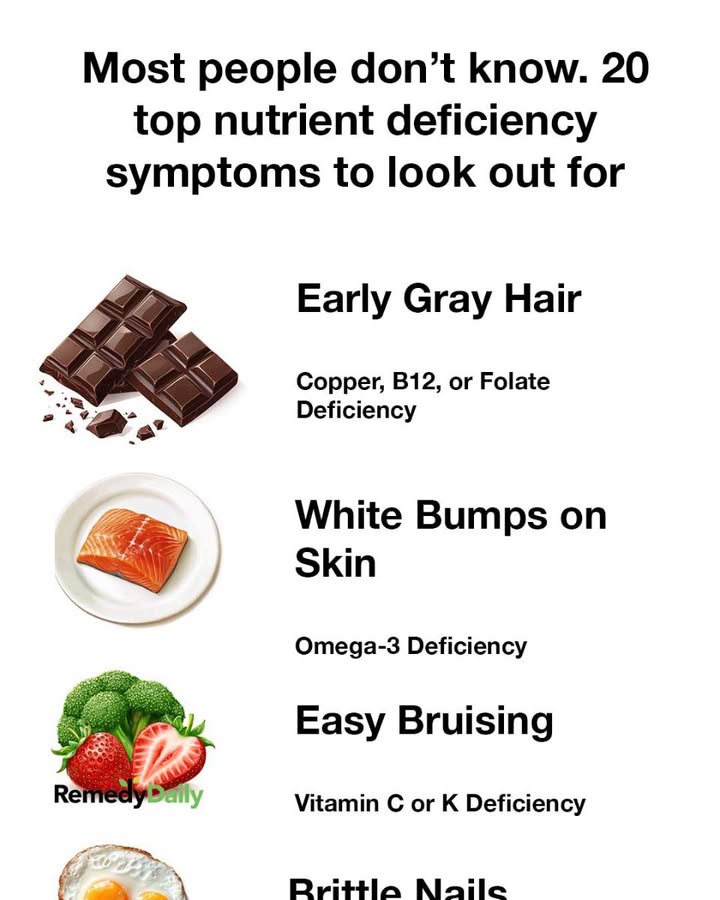ADVERTISEMENT

ADVERTISEMENT
Most people don’t know. 20 top nutrient deficiency symptoms to look out for
9. Poor Night Vision: Vitamin A Deficiency
Vitamin A is essential for maintaining healthy vision, particularly in low-light conditions. A deficiency can lead to night blindness, where the eyes struggle to adjust to darkness.
Eat:
Carrots, sweet potatoes, pumpkin
Spinach, kale
Liver
Cantaloupe, mango
10. Muscle Cramps: Magnesium Deficiency
Magnesium is vital for muscle function, and a deficiency can cause muscle cramps, spasms, and twitches. Magnesium helps regulate muscle contractions and relaxations.
Eat:
Nuts (almonds, cashews)
Dark leafy greens
Bananas
Whole grains
Dark chocolate (magnesium boost!)
11. Tingling in Hands and Feet: Vitamin B12 Deficiency
Vitamin B12 is essential for nerve health. A deficiency can lead to nerve damage, resulting in tingling or numbness in the hands and feet, known as peripheral neuropathy.
Eat:
Fish, meat, poultry
Eggs, dairy
Fortified cereals
Nutritional yeast
12. Mouth Ulcers: Folate or Iron Deficiency
Painful sores in the mouth, or ulcers, can be a sign of folate or iron deficiency. Both nutrients are important for cell growth and repair, and their lack can impair the healing process.
Eat:
Lentils, spinach, asparagus (folate)
Red meat, shellfish (iron)
Fortified grains
13. Cracked Lips: Riboflavin Deficiency
Cracked or sore lips, particularly at the corners of the mouth, can indicate a riboflavin (vitamin B2) deficiency. Riboflavin is important for maintaining healthy skin and mucous membranes.
Eat:
Milk, yogurt
Eggs
Almonds
Spinach, mushrooms
14. Dry Skin: Essential Fatty Acid Deficiency
Essential fatty acids, such as omega-3 and omega-6, are crucial for maintaining skin health. A deficiency can lead to dry, flaky skin, as these fats help maintain the skin’s barrier function.
Eat:
Salmon, sardines
Flaxseeds, chia seeds
Walnuts
Avocados
15. Restless Legs: Iron or Magnesium Deficiency
Restless leg syndrome, characterized by an uncontrollable urge to move the legs, can be linked to iron or magnesium deficiency. Both minerals are important for nerve and muscle function.
Eat:
Red meat, spinach (iron)
Pumpkin seeds, legumes, bananas (magnesium)
Dark chocolate (magnesium + mood booster)
16. Depression and Mood Swings: Omega-3 or Vitamin D Deficiency
Omega-3 fatty acids and vitamin D play roles in brain health and mood regulation. Deficiencies in these nutrients can contribute to depression and mood swings.
Eat:
Fatty fish (salmon, mackerel)
Walnuts, flaxseeds (omega-3)
Fortified dairy or plant milk (vitamin D)
Mushrooms and sunlight exposure
see next page
For Complete Cooking STEPS Please Head On Over To Next Page Or Open button (>) and don’t forget to SHARE with your Facebook friends
ADVERTISEMENT
